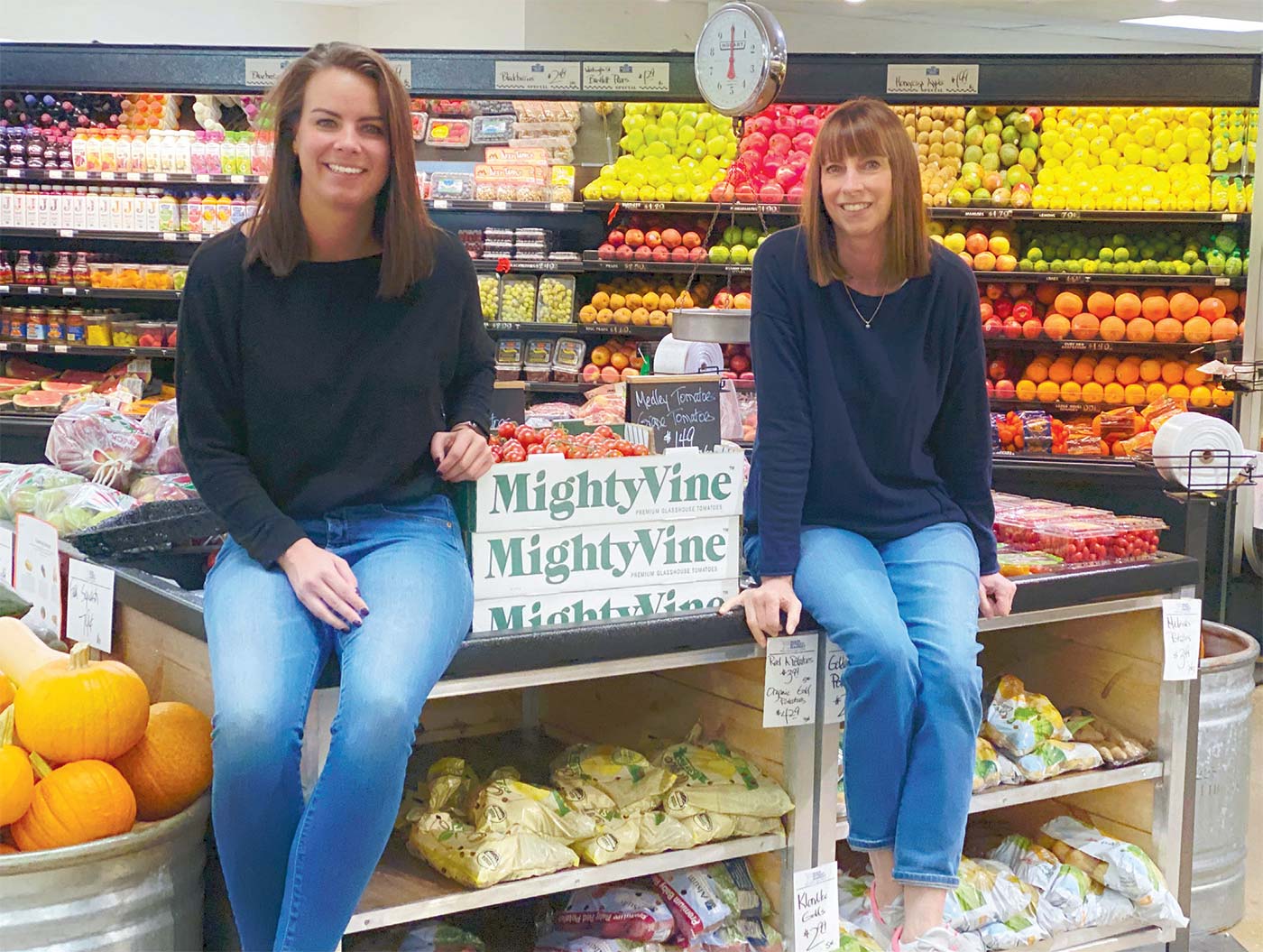Creating a Smaller Tomato Footprint
Plump, shiny, and yielding slightly to finger pressure, on-the-vine tomatoes wait like summer jewels displayed in the produce section of Main Street Market in Egg Harbor, year round. The words “Mighty Vine” are branded onto the side of the white cardboard box the tomatoes rest inside, and Main Street grocery progeny Regan Northrop is describing how she helped this seedling Illinois-based company set roots in the competitive grocery business.
“I’ve always been a tomato fanatic. I used to eat containers of them,” said Northrop, who grew up in the grocery business owned by her grandparents and parents.
It partially explains her choice to work for a tomato-growing company after graduating from St. Norbert College in De Pere with a degree in international business.
“Our company chairman, Jim Murphy, spends five to six months at his homes in Door County and he’s a (Main Street Market) customer. He and I were talking after Mighty Vine finished construction of their first hydroponic greenhouse in Rochelle (Illinois) … three weeks later I had a job doing sales for Mighty Vine.”
The Gibraltar High School grad’s traveling sales experience has given her a confident articulation, aided by her penetrating green-yellow eyes. Northrop spent her first year with Mighty Vine traveling from grocer to grocer in Illinois, working to convince them that the company’s sole product – sold-on-the-vine cherry and slicing tomatoes – would sell faster than a fresh pile of cheese curds before a Green Bay Packers game.
Regan’s role with Mighty Vine quickly advanced, and she’s now in a marketing position for Murphy’s broad group of companies that focus on production and distribution in the local food movement.
“Mighty Vine has provided me the opportunity to wear a lot of hats and learn different and new things, like financials, sales and the back-end of start-up business. Experimenting with marketing strategy has been really exciting.”
Her steepest learning curve? How to market a tomato, a product everyone already sells or uses in their restaurant or food production.
“When I first started selling for Mighty Vine, we didn’t even have any tomatoes ready yet for me to show,” Northrop said, “so it was difficult to get contracts at the beginning. The grocery store managers were skeptical but said they would give it a try. Whole Foods Market was the exception. We had a contract with them before we had product to sample.”
“Mighty Vine tomatoes are local, 365 days a year, and they taste good. These tomatoes do not travel outside of the Midwest, only within a 200 to 400-mile radius from Rochelle (including Door County). They move from each greenhouse in Illinois to the grocery store in one night..." — Regan Northrop
RAPIDLY GROWING
At the start in 2015, Mighty Vine had one 7.5-acre hydroponic greenhouse in Rochelle, Illinois, near the intersection of I-88 and I-39 south of Rockford. In December, Mighty Vine will complete its third 7.5-acre hydroponic greenhouse on its property in Rochelle. Each greenhouse protects and grows about 100,000 tomato plants that produce about 100,000 pounds of tomatoes each week.
“Everybody knows what a tomato tastes like, or should taste like,” Northrop said. “Mighty Vine tomatoes are local, 365 days a year, and they taste good. These tomatoes do not travel outside of the Midwest, only within a 200 to 400-mile radius from Rochelle (including Door County). They move from each greenhouse in Illinois to the grocery store in one night. We cornered a market where there was a need. Mighty Vine produces cherry tomatoes people actually eat in their lunch salads and tomatoes for slices people leave on their sandwiches rather than pick off into the trash.”
Most tomatoes Midwesterners have access to October through May (or June in Northeast Wisconsin) are squishy, bland, sandy-red, symmetrical orbs.
Mighty Vine’s trick to growing and distributing tomatoes that taste like – tomatoes? Mighty Vine growers allow the tomatoes to ripen on the vine. Their super red fruits (tomatoes are botanically considered a fruit) are proprietary seed varietals: Mighty Vine Tomato on the Vine (TOV) and Robinio Cherry on the Vine (COV). Mighty Vine describes their MVTOV as a “great tasting slicing tomato full of vibrant fl avor and color, sweet with mild acidity. Great used for burgers, sandwiches and salads.” The COV is described as a “perfect pop-in-your-mouth tomato with incredibly sweet flavor and ideal for snacking. Also great in salads, sandwiches and cooking. This delicious tomato delivers on taste.”
Northrop said Mighty Vine tests out new varietals now and again and is researching cost-effectiveness for production of other vegetables.
“The produce business, like farming, it’s old school,” Northrop said. “Produce managers know what they know and it’s hard to change mindsets.”
TEAMING UP WITH WASEDA FARMS
Given Mighty Vine’s distribution model of only allowing their tomatoes to travel within a half-day’s truck distance from the greenhouse, how are Mighty Vine’s tomatoes making a bit longer trip to Main Street Market and Waseda Farms in Door County? Family connections definitely have something to do with that explained Northrop with a smile and twinkle in her eye.
“We partnered with Waseda Farms for back-end egg hauling,” Northrop explained, keeping the semi-trucks full both ways, helping the travel logistics make financial sense.
“It also helps that Jim Murphy spends a lot of time in Door County, and he demanded our product be sold up here,” she added. “There’s been quite a few weekends, especially holidays, that I’ve loaded up my own car and brought them here myself.”
Mighty Vine is distributed by six-year-old Local Foods, another of Murphy’s start-ups, which is focused on sourcing produce solely from farmers in the Midwest. Local Foods’ CEO is Andrew Lutsey, whose father, Tom, founded Waseda Farms, and brothers Jeff and Matt Lutsey operate the organic farm in Baileys Harbor.
“I believe in this company,” Northrop said of why she continues to market tomatoes and Murphy’s other ventures. “It’s a successful start-up within our group of companies. I now split my time marketing three of our companies: Mighty Vine, Grow Forward (a venture capitalist firm investing in local and sustainable food production and technologies), and Foodhaul (food prep and delivery service). We’re focusing on expanding into more grocers, even heading west a bit (into Iowa).”
One last bit of advice from the self-professed tomato fanatic: “Keep your tomatoes on the counter, do not refrigerate them! Our ripe-from-the-vine Mighty Vine tomatoes will keep 10-14 days on your counter.”




